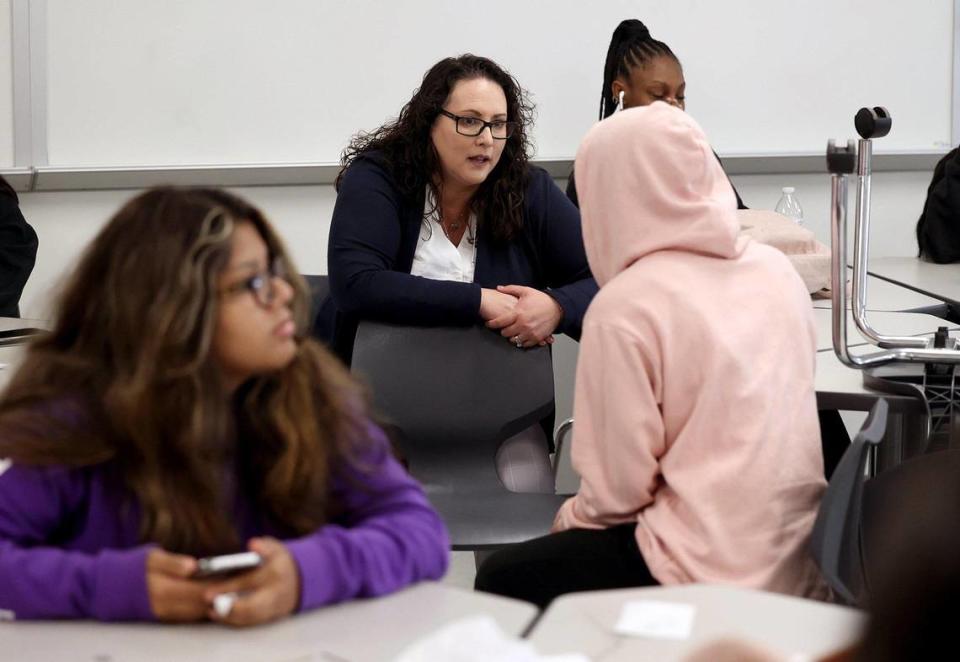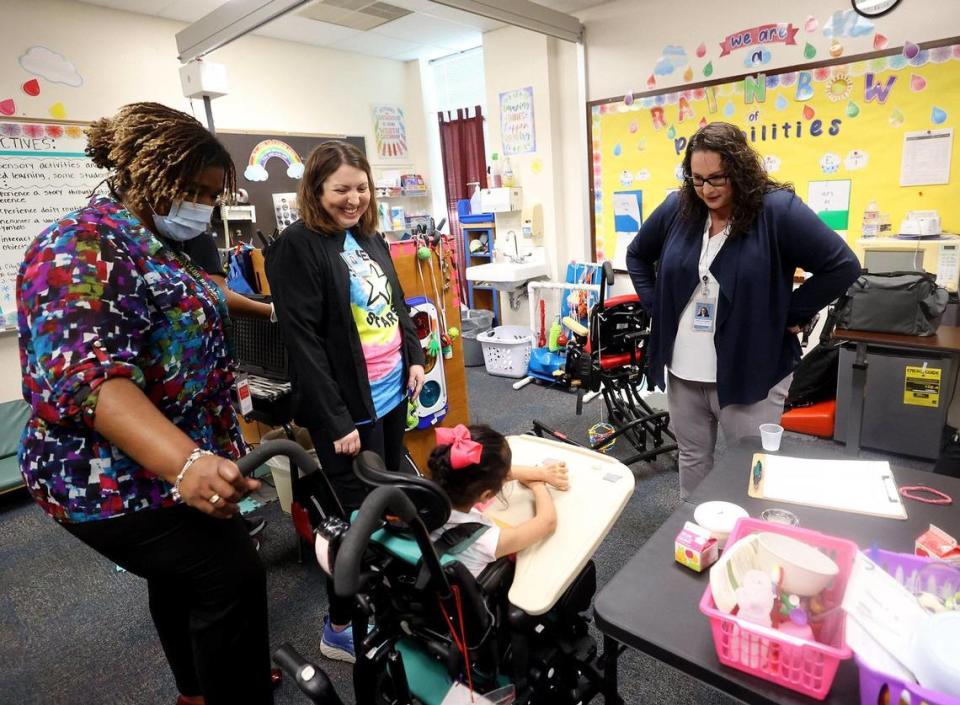Fort Worth ISD’s new superintendent just finished her first school year. How did it go?
When Angélica Ramsey came to the Fort Worth Independent School District last September, she told other district leaders that there were three things they wouldn’t like about her.
The first was that she’s hesitant to make decisions unilaterally. She prefers to talk to many people, including those closest to the issue at hand, meaning those decisions usually don’t happen quickly.
The second was that she tends to process new ideas by asking questions. Some people find that off-putting, she said — “I annoy, because I ask 17 questions so I can understand.”
The third is that she’s extremely fiscally conservative — “I’m always trying to find cost savings, cost savings, cost savings,” she said.
Ramsey’s first school year as the district’s new leader has been marked by dozens of conversations with key people like teachers and parents, hundreds of questions and plans — some of them painful — to cut costs at a time when the district’s enrollment is shrinking.
New FWISD superintendent inherited a range of challenges
Fort Worth ISD students and teachers left for the summer last month, marking the end of Ramsey’s first school year as the district superintendent. When she arrived in Fort Worth last September, Ramsey inherited a district where enrollment has been declining for years and neighborhood schools face growing competition from charter schools moving into the area. Fort Worth ISD also faces the same post-pandemic challenges that most other districts across the country are contending with, including staffing shortages, an uptick in student mental health issues and gaps in students’ knowledge left by months spent in remote learning.
Among Ramsey’s major decisions in her first year was a major staffing shakeup. In March, Ramsey met with hundreds of Fort Worth ISD employees at the district’s central office to tell them their jobs were either being eliminated or merged with other positions. A district spokeswoman said the job cuts were necessary because of enrollment declines and “the need to reallocate resources from central administration to impact student learning more positively.”
In a conversation with the Star-Telegram’s editorial board in April, Ramsey said it’s a challenge to figure out how many administrators a school district needs. There are staffing formulas that help district leaders decide how many teachers and support staff like nurses, counselors and custodians a school needs based on how many students it has, she said. But for central office staffing, no such guidance exists, either in Fort Worth or anywhere else, she said.
Ramsey brought in a consultant to figure out exactly how many administrative positions the district needed. The consultant looked at staffing models in successful school districts across the state. At the same time, Ramsey spoke with teachers and staff members in the district about what the district does well and what needs to improve. Many employees told her that they were frustrated at how difficult it was to communicate across departments in the district.
For example, the district has a single department that provides support and oversight of principals, while another deals with academics. Although those departments deal with similar matters, it’s difficult for anyone in one department to communicate with anyone in the other, she said. Some employees told her those boundaries were so rigid that it felt like each campus operated as its own single-site school district, rather than as a part of a larger organization with a coherent strategy.
Ramsey said her goal is for the district to come out of the staffing changes more nimble and better able to operate as a single organization where everyone works together around the same plan, and the district’s central office acts as a service center that exists to support schools.
Superintendent meets with panels of parents, students, others
Another of Ramsey’s major initiatives since coming to Fort Worth is the creation of advisory groups representing five key constituencies: students, parents, teachers, support staff and the broader community.
Tobi Jackson, president of Fort Worth ISD’s school board, said the panels are one of several ways the superintendent has increased communication. In particular, it’s crucial that Ramsey hears from members of the district’s support staff, who haven’t always had access to the superintendent but play important roles in students’ lives, Jackson said. School bus drivers, for example, are often the first district staff members to offer students a warm greeting in the morning and make them feel valued, she said.
Jackson she’s been impressed by how much Ramsey communicates with parents and other key groups in the district. Early in her tenure in the district, Ramsey began sending out weekly newsletters detailing school news and upcoming events. Jackson said those newsletters are a thorough accounting of goings-on in the district.
“If people sign up for her weekly communique, they’re going to know more about the district than they probably want to know,” Jackson said.
Jackson said she’s also been happy to see Ramsey meet with dozens of community groups, both large and small, as well as city leaders like former elected officials and current and former CEOs. It can take time for a new leader to learn the culture of her community, Jackson said, and building those relationships with other leaders early on can give Ramsey a head start.
In the coming months and years, Ramsey has a number of challenges ahead of her, Jackson said, not the least of which is figuring out how to streamline the district’s operations to keep up with declining enrollment. The district’s recent staffing reorganization is a big part of that, Jackson said, but Ramsey and other district leaders will also need to navigate the process of merging campuses and closing school buildings where enrollment has dropped below the point that it makes sense to keep them open. That process will have to include coming up with a plan for what to do with those facilities, Jackson said, because the district can’t leave blighted buildings in Fort Worth neighborhoods.
Another big challenge ahead of the district is improving attendance rates, Jackson said. Like many districts across the country, Fort Worth ISD saw its attendance rates drop during the pandemic. And also like many districts, Fort Worth has struggled to get its attendance rates back up to pre-pandemic levels. Jackson said the district can’t address student achievement until it deals with the problem of chronic absenteeism. Part of that issue comes down to making sure that schools are welcoming environments, and that students know that they’re missed when they’re absent, she said.
New superintendent consults with parents on upcoming decisions
Ken Kuhl, president of the Fort Worth ISD Council of PTAs, said he was pleased to see how much time Ramsey spent in schools around the district in her first year as superintendent. On Ramsey’s first day in the district, she visited Kuhl’s daughter’s classroom at South Hi Mount Elementary School as a part of a broader series of visits to campuses around the district, he said. It’s important for a new leader to make those kinds of visits early on, he said, so that everyone in the district, from top administrators to students, knows who she is.
In early visits to PTA groups, Ramsey did more listening than talking, Kuhl said. Parents came to her with ideas or questions, ranging from high-level concerns about issues like special education to complaints about problems at their child’s specific campus, like broken sidewalks, he said. Because Ramsey was so new, she didn’t always have answers, but she consistently offered to put parents in touch with the district staff member who could help them, he said.
One occasion on which Ramsey did more talking than listening was during a conversation about the biggest issues facing the district, Kuhl said. Ramsey was forthright about the challenge of declining enrollment, Kuhl said. She told parents that the district had lost students during the pandemic, and it may continue to lose even more students to charter schools moving into the area. She said the district would need to downsize to keep up with enrollment declines, Kuhl said.
“Those are things that you could be less transparent about and it would make the conversation easier,” he said.
Kuhl, who also serves on Ramsey’s parent advisory board, said the superintendent often brings major decisions before the group to hash out before they go before the school board. A recent example was her proposal for the district’s calendar for the 2023-24 school year. Members of the parents board suggested a few modifications to her proposed calendar, and the version of the calendar that was eventually approved by the school board reflected those changes, he said. Kuhl said parents appreciated that Ramsey listened to their thoughts and took them under advisement.
“Everybody likes being listened to,” he said.
Tiffany Rogers, another member of Ramsey’s parent advisory board, said she thinks the superintendent’s willingness to listen to ideas from members of the community is a hopeful sign for the district’s future. The district’s continued declining enrollment presents challenges that the district will have to deal with — challenges she expects will only get thornier if Texas lawmakers pass a proposed school voucher plan.
District leaders may have to make decisions that not everyone likes, she said. But if Ramsey continues to include parents and community leaders in her decision-making process she has up to now, Rogers said she’s hopeful that the district will be able to arrive at solutions that nearly everyone can live with.
Aside from the challenges created by declining enrollment, Rogers said Ramsey will also have to contend with the frustrations of running a school district in a politically polarized environment. At a time when school board meetings across the country are dominated by arguments about book bans, LGBTQ+ issues and how teachers deal with darker chapters in America’s past, Ramsey may find it challenging to unite people with a wide range of viewpoints around a single plan for the district, Rogers said. But she said she’s been impressed with the superintendent’s ability to speak in a way that gets through to people on all sides of the political spectrum.
Fort Worth parents group is cautiously optimistic about new leader
Trenace Dorsey-Hollins, president of the parent advocacy group Parent Shield Fort Worth, said she’s been pleased to see that Ramsey seems receptive to the idea of talking with parents about their concerns. During a school board meeting in April, board member Ann Darr asked Ramsey to follow up with a Parent Shield member who discussed concerns about her daughter’s school during the public comment section of the meeting. Ramsey replied that her staff was already working to set up a meeting with the organization.
In the past, Dorsey-Hollins, whose daughter goes to Greenbriar Elementary School, said she’s felt as though district leaders heard her concerns, but weren’t interested in doing anything about them. Although she hasn’t had a one-on-one conversation with Ramsey yet — the group is scheduled to meet with the superintendent on Wednesday— Dorsey-Hollins said she’s cautiously optimistic. She thinks it’s a good sign that Ramsey was willing to schedule a meeting with the group at all, she said.
Taundala Tindle, a Parent Shield member who has kids at Van Zandt-Guinn Elementary School, Morningside Middle School and Polytechnic High School, said she wants to see Ramsey focus on school safety around the district. She’d like to see the district hire more security guards and school resource officers to keep kids safe on campus. The amount of gun violence she sees happening in the world has her concerned.
“It’s not safe anymore,” Tindle said. “It’s not safe. You can’t even go out and go to the mall and shop or do anything anymore without looking over your shoulder.”
LaShanta Mire, another member of the parents group, has kids at Clifford Davis Elementary School and Forest Oak Middle School. She said she hopes to see Ramsey and other district leaders prioritize bullying prevention. She’s heard of students as young as first grade being bullied, and she’s worried about how it affects the mental health of students who feel targeted at school.
Mire also said she hopes to see Ramsey continue to listen to parents in the district about their priorities for the children’s schools. Parents care deeply about their children’s future, she said, and they want to see them succeed in school. School leaders should think of parents as partners in their children’s education, she said. She wants school leaders to know that, as much as parents need from the district, there are also ways that they can help their kids’ schools.
“It takes a village,” she said. “...It takes more than one person to get this ball rolling.”









